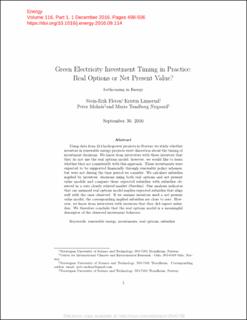Green electricity investment timing in practice: Real options or net present value?
Peer reviewed, Journal article
Accepted version
Permanent lenke
https://hdl.handle.net/11250/2740620Utgivelsesdato
2016Metadata
Vis full innførselSamlinger
- Journal articles [478]
Sammendrag
Using data from 214 hydropower projects in Norway we study whether investors in renewable energy projects exert discretion about the timing of investment decisions. We know from interviews with these investors that they do not use the real options model; however, we would like to learn whether they act consistently with this approach. These investments were expected to be supported financially through renewable policy schemes, but were not during the time period we consider. We calculate subsidies implied by investors' decisions using both real options and net present value models and compare these expected subsidies with subsidies observed in a very closely related market (Sweden). Our analysis indicates that our assumed real options model implies expected subsidies that align well with the ones observed. If we assume investors used a net present value model, the corresponding implied subsidies are close to zero. However, we know from interviews with investors that they did expect subsidies. We therefore conclude that the real options model is a meaningful descriptor of the observed investment behavior.
